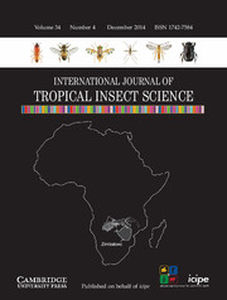Article contents
Some parameters affecting suitability of Cicadulina species for resistance screening to maize streak virus (MSV)
Published online by Cambridge University Press: 19 September 2011
Abstract
Available pieces of information on Cicadulina sp. leafhopper biology, with specific references to the suitability of various species for mass rearing and resistance screening for maize streak virus (MSV) are critically reviewed. The following are summarized: (a) effect of distribution pattern and species composition on the efficiency of collection of live specimens for establishing a colony for mass rearing; (b) species biology and fecundity as affected by temperature and humidity; (c) species specificity in MSV transmission; (d) host plant preference and adaptation to mass rearing conditions. All these parameters affect the suitability of various Cicadulina species used as vectors in maize resistance screening and breeding to MSV disease.
Résumé
On procède actuellement à une étude critique des informations diponibles sur la biologie de Cicadulina spp. principalement centrée sur le recours possible à plusieurs espèces pour l'élevage de masse et le criblage en fonction de la résistance du maïs au Virus de la Striure (MSV). L'article qui suit résume les aspects suivants: (a) effet du schéma de dissémination et de la composition de l'espèce sur l'efficacité de la collecte de spécimens vivants en vue de l'établissement d'une colonie de base pour l'élevage de masse; (b) effets de la température et de l'humidité sur la biologie et la fécondité des espèces; (c) spécificité des espèces vectrices du MSV; (d) préférence pour le plant-hôte et adaptation aux conditions d'élevage de masse. Tous ces paramètres déterminent le choix de diverses espèces de Cicadulina en tant que vecteurs utilisés dans le cadre de la sélection à la résistance au Virus de la Striure du Maïs.
Keywords
- Type
- Symposium VIII: Plant Resistance in Tropical Insect Pest Management
- Information
- International Journal of Tropical Insect Science , Volume 8 , Issue 4-5-6: Recent Advances in Research on Tropical Entomology , December 1987 , pp. 757 - 764
- Copyright
- Copyright © ICIPE 1987
References
REFERENCES
- 1
- Cited by


